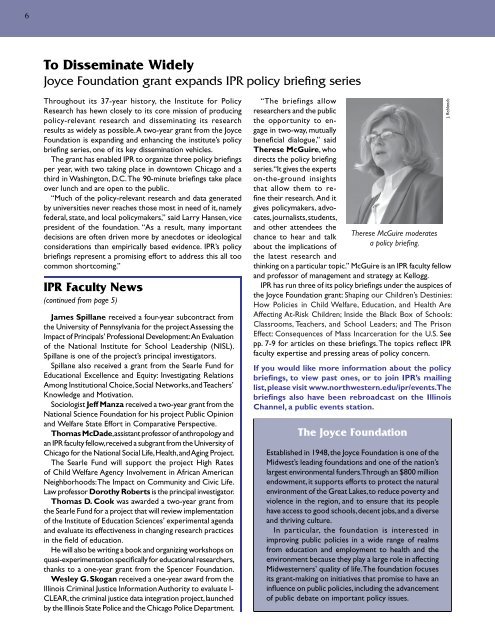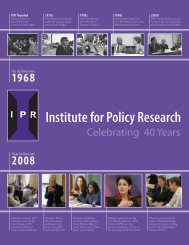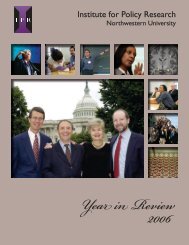Whatever Happened to the Emerging Democratic Majority?
Whatever Happened to the Emerging Democratic Majority?
Whatever Happened to the Emerging Democratic Majority?
You also want an ePaper? Increase the reach of your titles
YUMPU automatically turns print PDFs into web optimized ePapers that Google loves.
J. Reblando<br />
6<br />
To Disseminate Widely<br />
Joyce Foundation grant expands IPR policy briefing series<br />
Throughout its 37-year his<strong>to</strong>ry, <strong>the</strong> Institute for Policy<br />
Research has hewn closely <strong>to</strong> its core mission of producing<br />
policy-relevant research and disseminating its research<br />
results as widely as possible. A two-year grant from <strong>the</strong> Joyce<br />
Foundation is expanding and enhancing <strong>the</strong> institute’s policy<br />
briefi ng series, one of its key dissemination vehicles.<br />
The grant has enabled IPR <strong>to</strong> organize three policy briefi ngs<br />
per year, with two taking place in down<strong>to</strong>wn Chicago and a<br />
third in Washing<strong>to</strong>n, D.C. The 90-minute briefi ngs take place<br />
over lunch and are open <strong>to</strong> <strong>the</strong> public.<br />
“Much of <strong>the</strong> policy-relevant research and data generated<br />
by universities never reaches those most in need of it, namely<br />
federal, state, and local policymakers,” said Larry Hansen, vice<br />
president of <strong>the</strong> foundation. “As a result, many important<br />
decisions are often driven more by anecdotes or ideological<br />
considerations than empirically based evidence. IPR’s policy<br />
briefi ngs represent a promising effort <strong>to</strong> address this all <strong>to</strong>o<br />
common shortcoming.”<br />
IPR Faculty News<br />
(continued from page 5)<br />
James Spillane received a four-year subcontract from<br />
<strong>the</strong> University of Pennsylvania for <strong>the</strong> project Assessing <strong>the</strong><br />
Impact of Principals’ Professional Development: An Evaluation<br />
of <strong>the</strong> National Institute for School Leadership (NISL).<br />
Spillane is one of <strong>the</strong> project’s principal investiga<strong>to</strong>rs.<br />
Spillane also received a grant from <strong>the</strong> Searle Fund for<br />
Educational Excellence and Equity: Investigating Relations<br />
Among Institutional Choice, Social Networks, and Teachers’<br />
Knowledge and Motivation.<br />
Sociologist Jeff Manza received a two-year grant from <strong>the</strong><br />
National Science Foundation for his project Public Opinion<br />
and Welfare State Effort in Comparative Perspective.<br />
Thomas McDade, assistant professor of anthropology and<br />
an IPR faculty fellow, received a subgrant from <strong>the</strong> University of<br />
Chicago for <strong>the</strong> National Social Life, Health, and Aging Project.<br />
The Searle Fund will support <strong>the</strong> project High Rates<br />
of Child Welfare Agency Involvement in African American<br />
Neighborhoods: The Impact on Community and Civic Life.<br />
Law professor Dorothy Roberts is <strong>the</strong> principal investiga<strong>to</strong>r.<br />
Thomas D. Cook was awarded a two-year grant from<br />
<strong>the</strong> Searle Fund for a project that will review implementation<br />
of <strong>the</strong> Institute of Education Sciences’ experimental agenda<br />
and evaluate its effectiveness in changing research practices<br />
in <strong>the</strong> fi eld of education.<br />
He will also be writing a book and organizing workshops on<br />
quasi-experimentation specifically for educational researchers,<br />
thanks <strong>to</strong> a one-year grant from <strong>the</strong> Spencer Foundation.<br />
Wesley G. Skogan received a one-year award from <strong>the</strong><br />
Illinois Criminal Justice Information Authority <strong>to</strong> evaluate I-<br />
CLEAR, <strong>the</strong> criminal justice data integration project, launched<br />
by <strong>the</strong> Illinois State Police and <strong>the</strong> Chicago Police Department.<br />
“The briefings allow<br />
researchers and <strong>the</strong> public<br />
<strong>the</strong> opportunity <strong>to</strong> engage<br />
in two-way, mutually<br />
benefi cial dialogue,” said<br />
Therese McGuire, who<br />
directs <strong>the</strong> policy briefi ng<br />
series. “It gives <strong>the</strong> experts<br />
on-<strong>the</strong>-ground insights<br />
that allow <strong>the</strong>m <strong>to</strong> refi<br />
ne <strong>the</strong>ir research. And it<br />
gives policymakers, advocates,<br />
journalists, students,<br />
and o<strong>the</strong>r attendees <strong>the</strong><br />
chance <strong>to</strong> hear and talk<br />
about <strong>the</strong> implications of<br />
<strong>the</strong> latest research and<br />
Therese McGuire moderates<br />
a policy briefi ng.<br />
thinking on a particular <strong>to</strong>pic.” McGuire is an IPR faculty fellow<br />
and professor of management and strategy at Kellogg.<br />
IPR has run three of its policy briefings under <strong>the</strong> auspices of<br />
<strong>the</strong> Joyce Foundation grant: Shaping our Children’s Destinies:<br />
How Policies in Child Welfare, Education, and Health Are<br />
Affecting At-Risk Children; Inside <strong>the</strong> Black Box of Schools:<br />
Classrooms, Teachers, and School Leaders; and The Prison<br />
Effect: Consequences of Mass Incarceration for <strong>the</strong> U.S. See<br />
pp. 7-9 for articles on <strong>the</strong>se briefi ngs. The <strong>to</strong>pics refl ect IPR<br />
faculty expertise and pressing areas of policy concern.<br />
If you would like more information about <strong>the</strong> policy<br />
briefings, <strong>to</strong> view past ones, or <strong>to</strong> join IPR’s mailing<br />
list, please visit www.northwestern.edu/ipr/events. The<br />
briefings also have been rebroadcast on <strong>the</strong> Illinois<br />
Channel, a public events station.<br />
The Joyce Foundation<br />
Established in 1948, <strong>the</strong> Joyce Foundation is one of <strong>the</strong><br />
Midwest’s leading foundations and one of <strong>the</strong> nation’s<br />
largest environmental funders. Through an $800 million<br />
endowment, it supports efforts <strong>to</strong> protect <strong>the</strong> natural<br />
environment of <strong>the</strong> Great Lakes, <strong>to</strong> reduce poverty and<br />
violence in <strong>the</strong> region, and <strong>to</strong> ensure that its people<br />
have access <strong>to</strong> good schools, decent jobs, and a diverse<br />
and thriving culture.<br />
In particular, <strong>the</strong> foundation is interested in<br />
improving public policies in a wide range of realms<br />
from education and employment <strong>to</strong> health and <strong>the</strong><br />
environment because <strong>the</strong>y play a large role in affecting<br />
Midwesterners’ quality of life. The foundation focuses<br />
its grant-making on initiatives that promise <strong>to</strong> have an<br />
influence on public policies, including <strong>the</strong> advancement<br />
of public debate on important policy issues.
















